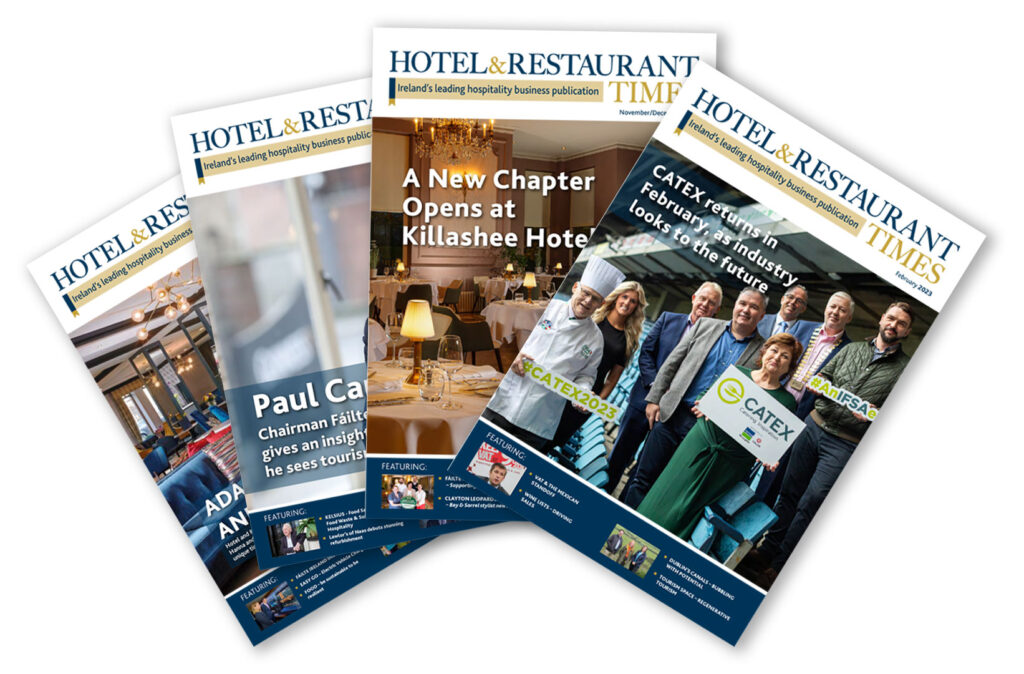The Irish hospitality is facing major challenges in 2024 when the “perfect storm” of legislative employment changes take affect and employers struggle to keep up with wage demands – particularly for catering assistants and bar and waiting staff.
This is the key assertion made in Excel Recruitment’s 2024 Hotel and Catering Salary Guide, which was published today. The guide tracks changes in salary for a plethora of roles across the hospitality sector, giving both employees and employers alike a sense of what has happened over the past year and what the next 12 months are likely to have in store.
Headline findings from the guide reveal that:
- Chefs have secured some of the greatest pay rises in the sector – thanks in large part to the huge demand for such staff. For example, the average salary of a second-year commis chef has risen by about 14pc – up from €28,000 to €32,000; while a sous chef can expect to earn an average salary of €52,000 in 2024 – up from €47,000 in 2023; and a junior sous-chef can now expect a typical salary of €45,000 – up from €40,000 a year ago (12.5%).
- There have been salary increases across the board in a variety of roles ranging from wedding coordinators to waiting staff to bar managers to receptionists, amongst others. For example, the average salary for a receptionist has increased from €32,000 to €36,000 while a wedding coordinator can expect to earn €40,000 on average in 2024 – up from €37,500 in 2023.
Commenting on the findings of the guide, Shane McLave, Managing Director of Excel Recruitment said:
“Without a doubt, the biggest threat facing the hospitality industry in 2024 is the spiralling cost of employment and not a shortage of staff.
But the devil is in the detail – the wage increases we are seeing are in more junior roles. And while you might think that pay increases in lower-paid roles should not be as much of a challenge for businesses as increases in higher-paid roles, that is not the case. Positions such as bar staff, waiting staff and catering assistants are what are known as “high volume roles”, meaning that businesses need a lot of staff in these positions in order to function.
With the increase in the minimum wage, we are seeing that what were once supervisory salaries are now being offered for entry-level positions as well as to bar and waiting staff, with pay rates there raising from €13 to €15 per hour.
The cumulative effect of the seemingly modest incremental increases that we are seeing across the board in these lower-paid but high volume roles is putting huge pressure on businesses in the hospitality industry and this will dominate the fortunes of the hotel and category sector in 2024. Wage increases could cripple Irish hospitality businesses in 2024.”

Shane McLave, Managing Director of Excel Recruitment
Excel Recruitment cites a recent IBEC report which found that while 84pc of businesses increased wages in 2023, a further 82pc plan on increasing them again in 2024. The recruitment specialists add that seven things are happening that are driving the cost of employment up, and this will no doubt result in many small and independent establishments closing their doors for the last time. These are:
- The biggest-ever raise in the minimum wage about to hit, taking us from €11.30 to €12.70 per hour.
- Plans to replace the minimum wage with the living wage over the next two years, This will likely increase minimum hourly rates of pay to €15 per hour in 2026, according to projections from the Low Pay Commission, meaning employers are facing two more large jumps in pay rates in the very near future.
- An increase in employer-paid sick leave rising to five days in 2024 and then ten days in two years.
- Pension auto-enrolment.
- The much welcomed and needed Domestic Violence and Abuse Act adding a potential five days of full pay.
- The lack of rental accommodation and the spiralling cost of living. This is driving people out of the cities with a reluctance to commute in and making work-from-home positions more desirable, an option that is rarely possible for most positions in the hospitality industry.
- Increases in employer PRSI coming in annually over the next few years.
In addition, there are also more general challenges facing employers. Mr McLave explained,
“The nature of hospitality work itself is becoming less and less attractive for Ireland’s workforce and skilled staff are harder to come by. This has created a candidate-driven market.
Flexibility in the workplace has increasingly become a desire for many, and many workers are simply not willing to work the same traditional hours anymore.
Many of our clients report an increase in the standard benefits being offered to their staff, like pensions, extra holidays, four-day weeks, and so on. Employers are consistently finding themselves under pressure to up their game in order to retain and attract staff but given the financial pressure that so many are under and the increased costs employers are facing, this can only go on for so long.”



















